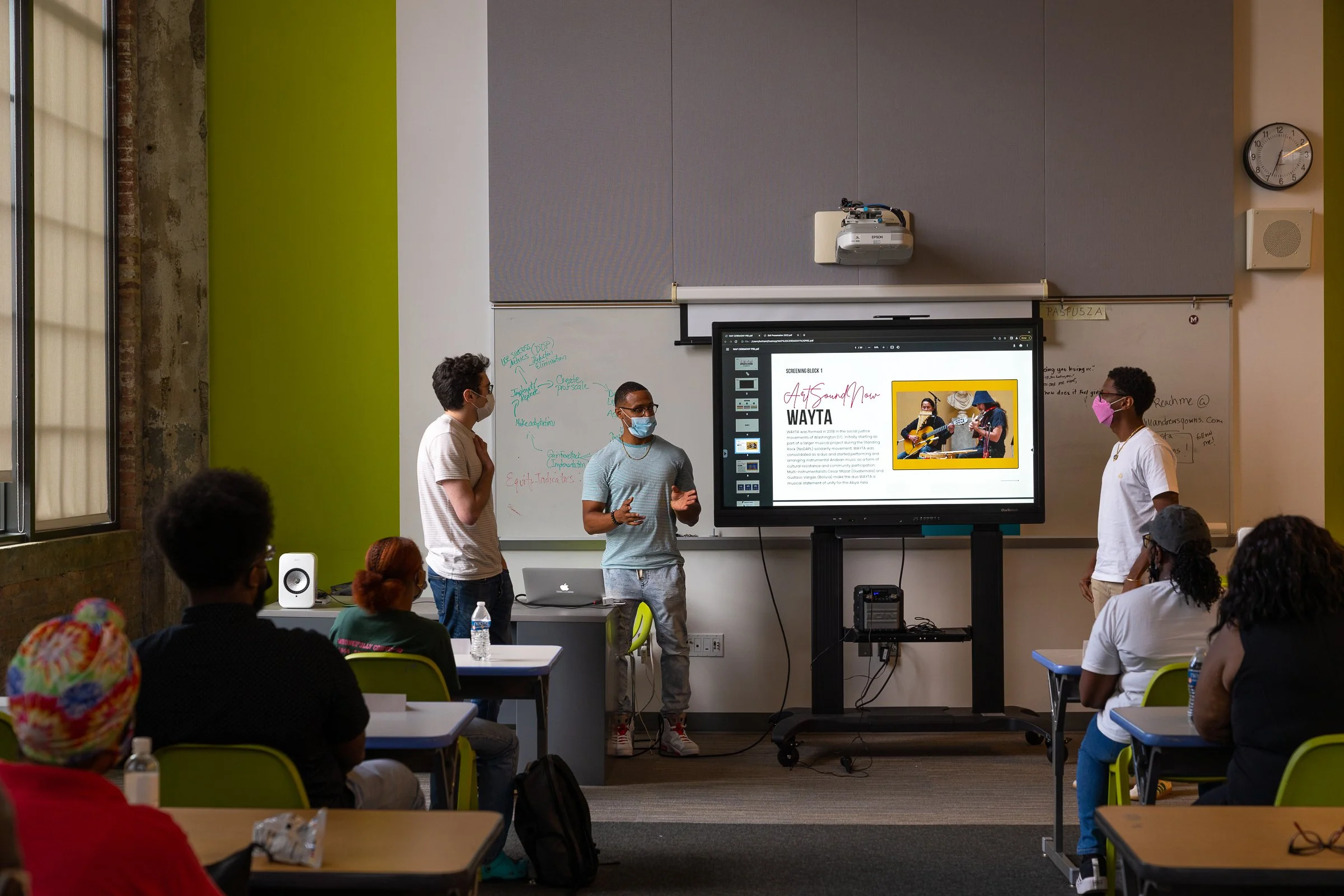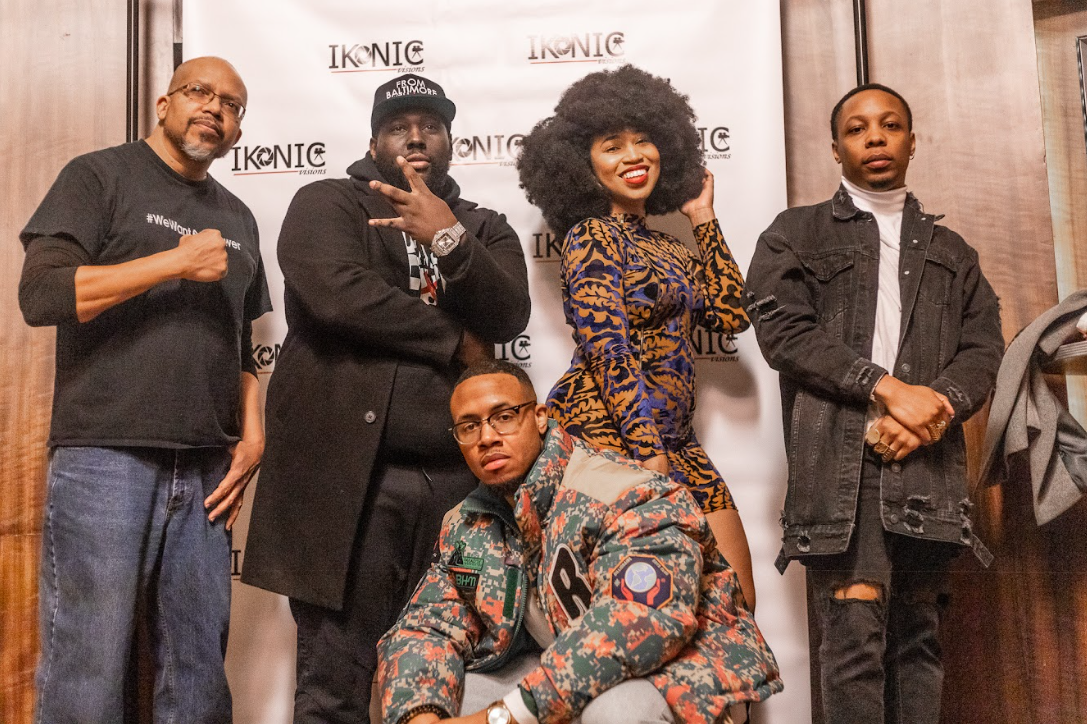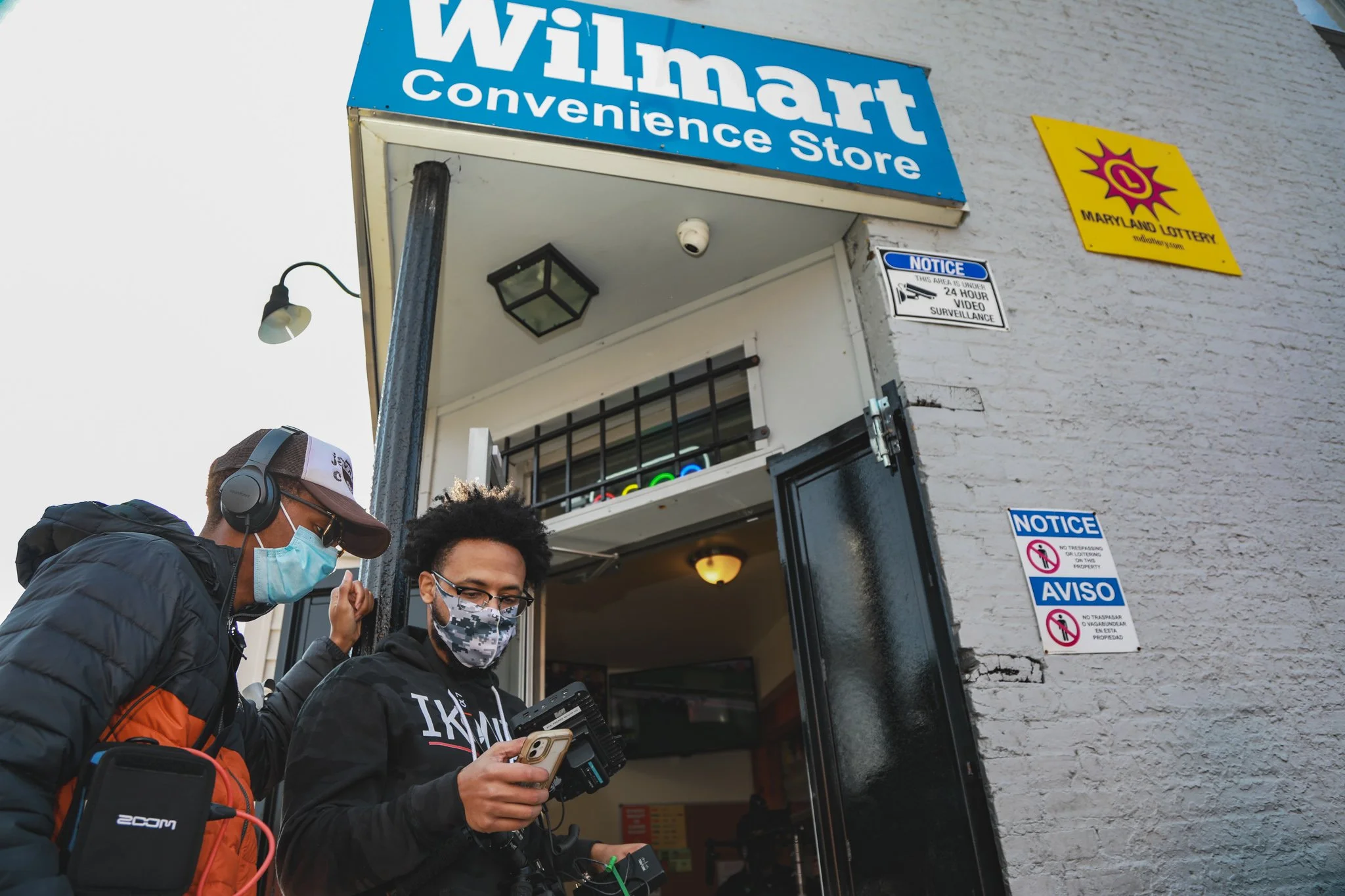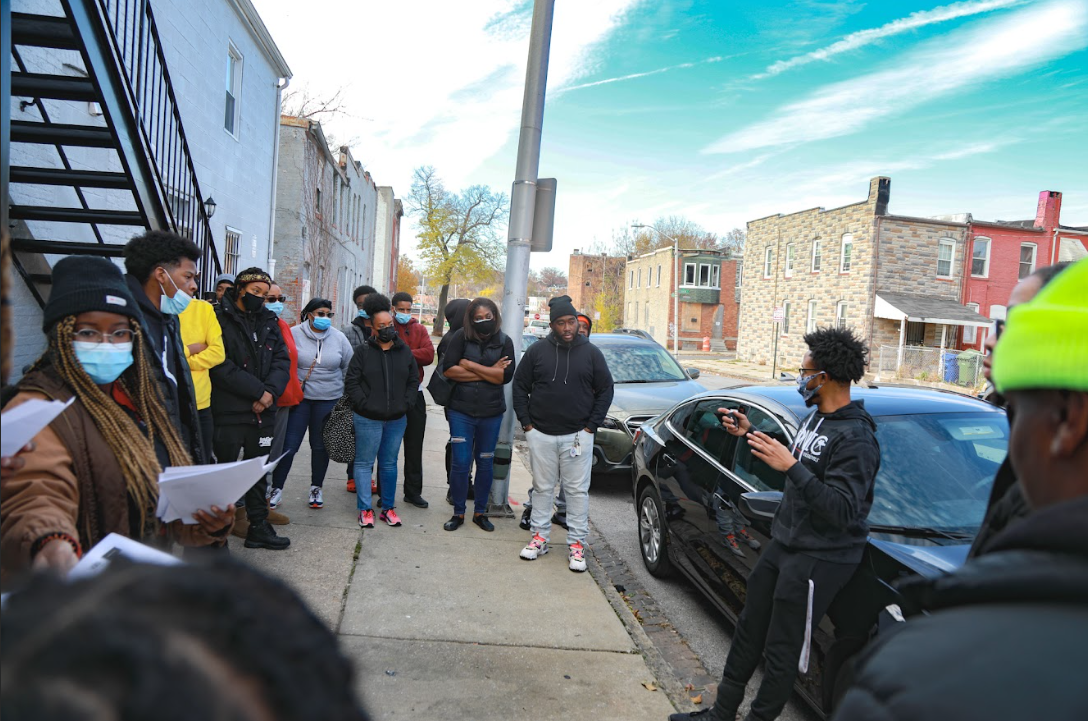A CONVERSATION WITH: MACEO TENDAJI
Maceo Tendaji at the world premiere of his short film “Paralysis.” Photo by Bree McCoy.
This blog is part of our series, A Conversation WITH. As a media organization, we highlight members of our team - past and present - that have done awesome work with Wide Angle, while also pursuing their own creative goals.
Maceo “Tendaji” Lester is a filmmaker based in Baltimore, MD. His work ranges from music videos, narrative film, documentaries and wedding videography. Lester received his BA in Mass Communications at Virginia State University and his MFA in Film from the Maryland Institute College of Art. His love of music, sports and African-American culture are very prevalent in his work. His work has been screened and won awards at several film festivals across the nation and internationally. Lester aspires to tell authentic stories that will substantially impact race/gender equity and help cultivate storytellers of the next generation. He is a former Workforce Manager and Media Instructor at Wide Angle.
Current read: I’m not much of a reader but the last book I dug into is “Story” by Robert McKee
Song on repeat: Not a song but an album - Larry June - “The Great Escape”
Favorite spot in Baltimore: Too many to choose from!
Tell us about your background
I was born in Baltimore, raised in Glen Burnie. I’m now a Baltimore-based filmmaker. I started my video/film journey in high school. It was my senior year of high school and my failed basketball career left me clueless and somewhat rebellious. I didn’t want to go to college nor did I know what I would study once I got there. But one day during my senior year of high school, I was in an elective class that introduced me to video producing. We were using some old Windows laptops and digital cameras and were instructed to make a mock commercial for a product. I really enjoyed shooting the video and enjoyed editing the video even more. The rest is history, I discovered my college major and my passion all in the same day.
How did you find out about WAYM? What made you join?
I found out about WAYM when I was job hunting. I was in Los Angeles at the time looking to uproot my career in Baltimore and take it to the west coast. However, things didn’t work out. I applied to several jobs in LA and didn’t receive any call backs. I applied to one job in Baltimore, that one job happened to be Wide Angle. I was hired as a contractor to edit. That contract led to a part-time position which eventually became full-time and that led to a supervisor position.
I joined because I actually enjoyed the projects I was working on. I was becoming a more organized editor and seasoned media professional. The staff at Wide Angle were very friendly and I saw myself fitting in well.
What is one of your favorite memories at WAYM?
I’m not sure if I can pinpoint an exact moment. But I really enjoyed going on Maryland State Arts Council shoots with the Productions team. It was cool to travel around the state and immerse ourselves in foreign communities, cultures, and arts. Those shoots always felt like a field trip.
How has teaching media impacted you?
Teaching is very impactful. Education is a two-way street. As you teach your students you learn more about the subject matter and learn more about yourself. I believe teaching has helped me become a better communicator, mentor, and leader.
What advice do you have for young filmmakers?
Write from within. It’s ok to draw influences from your favorite films or filmmakers but the secret sauce is within you. Writing from your own experiences, your own theories, your own friends/family members is what makes your work unique. It’s a story that only you can tell.
If you want to be more on the production crew side of things, I’d advise young filmmakers to pick one thing and learn everything there is to know about that position. Master the craft and do it very, very well. Excelling in one skill increases your value-add and will eventually lead to other opportunities.
Maceo Tendaji with the productions team at Wide Angle’s annual event in 2019.
Maceo Tendaji presenting with productions apprentices Ben and Brandon at our Apprentice Ceremony & Shareback in 2022.
Congrats on the world premiere of your short film! Can you share an overview about this project?
I came up with the concept of “Paralysis” shortly after the George Floyd murder. I was hearing and seeing several conversations about what people would do if they witnessed the altercation between Floyd and the officer. Everybody sounded tough and calculated but I highly doubt they’d respond that way if they were eyewitnesses. Then I began to ask “Why don’t people do anything in those situations?” “Who would do something?” “What would they do?” This is what started the brainstorming process and I began to build from there.
What inspired the film and why was it an important film for you to make?
As I mention; the George Floyd incident was the main catalyst but I also thought about Mike Brown, Tamir Rice, Sandra Bland, and countless others who lost their lives at the hands of law enforcement. I also was inspired by the white man who chased me in his pickup truck when I was riding my bike at the age of thirteen. I thought about how I was an innocent child minding my business playing outside with my friends and this man decided to come out of his house and chase us, accuse us of stealing his property and endangered us and himself. The officer in “Paralysis,” Nate O’Connor, played by Nate Nelson, is the embodiment of that man who chased me many years ago.
I believe this film was important to make because police brutality, racial profiling and many other social issues that plague BIPOC communities [Black, Indigenous, and other People of Color] are still very prevalent today. I think this film keeps the conversation going. When these incidents happen, the media storm intrudes these communities, exploits the death of the victim, and then everything dissipates. However, these communities that are already impoverished are now traumatized even more. No one comes back to check on the victims’ family or community members. No one comes to invest into the neighborhood or tries to prevent these incidents from reoccuring. Everyone just goes back to living life like it’s normal. I believe “Paralysis,” gives a voice to so many people who have gone unheard. I believe this film keeps the conversation going, it reminds us that many police departments are corrupt and something needs to be done about it. I think “Paralysis,” is somewhat therapeutic because it prompts people to speak about their trauma and I believe that’s the first step towards healing.
Maceo Tendaji with poets Analysis, Black Chakra, Akilah Divine, and Ephraim Nehemiah. Photo by Christina Randolph
The night of your premiere was a packed house. We saw your film at the Senator Theatre, heard from talented poets featured in the film, and engaged in a participatory Q & A session with you and the poets. Can you tell us what was going through your head that night?
Believe it or not, I was calm, cool, and collected throughout the entire day. I was waiting for the nerves to kick in but they never did (I’m not sure why). I envisioned that day like a year prior. I knew exactly what I wanted it to look like, who I wanted in the building, and what I wanted the end result to be. I think I came pretty close to my vision. I was very confident in the poets because they’re amazing artists and performers, I knew they would deliver. I took my time with each phase of production and was confident about the finished product of the film. It’s like preparing for a test; if you do your homework, study, and prepare, there’s not much to be nervous about.
A few Wide Angle apprentices helped work on your film and you had young and older actors. Can you speak to the importance of intergenerational collaboration on your project?
I think intergenerational collaboration with any project or business is important. The younger generation brings innovation and that youthful spark of energy. The older generation can provide wisdom, mentorship, and experience. I think when you blend the two together it can be a recipe for success. For “Paralysis” in particular, I definitely wanted to have representation from the older generation in the cast because the social issues that plague the Black community have been persistent since America’s conception. So with Ken Brown’s character (Mr. Willie), I wanted to have a more seasoned character in the film that has a broader vantage point because unfortunately he has seen this episode of police brutality in his community far too many times. In the film, Mr. Willie is struggling with the fact that he has witnessed mistreatment towards his people his entire life and still doesn’t have the courage or know how to protect them.
Behind the scenes with Wide Angle apprentice Tahir. Photo by Xavier Plater
Behind the scenes with Wide Angle apprentice Brandon. Photo by Xavier Plater
What was the hardest artistic choice you made during the making of this film?
I think trimming the poem down was tough. There were certain lines in the poem that were very powerful but for timing purposes I had to cut a few lines out. I didn’t want the poem or film to drag for too long. I tried to find the perfect timing of when to start the film and when to end it so that there aren’t stale moments. I wanted the audience to be engaged in this world the entire time.
What were some of the biggest challenges? OR What (if anything) would you do differently if you could go back and do it again?
We were faced with a lot of time constraints due to our permits and budget. Some of the scenes we had to rush through. I really wish we had more time to get more takes and sit with the scene some more to massage a few lines and develop more chemistry with the actors. I also believe I dedicated too much time on the poem section of the film and didn’t do enough rehearsals for the dialogue scenes. In hindsight, I would have had more table reads and would have just gotten the cast together to hangout, maybe take them out to dinner just to vibe with each other.
The police altercation was by far the hardest scene to film. We were racing against the sun and we only had one rehearsal prior to the shoot. Next time I do a scene like this I’m going to be sure to thoroughly choreograph each action and plan each shot based on the action. A lot of this film was “run and gun” and figuring it out as we went. I had a strong idea and vision for each shot but it’s not the same as doing test shoots. I’d also be interested in bringing in a stunt person or someone who choreographs fight scenes for movies. That would have been a huge help.
What is something that you learned about yourself during the making of your short film?
I learned to develop more patience. I’m naturally a very impatient person and I want things done efficiently with excellence. This project taught me to make sure I give each phase of production its due diligence. From fundraising, pre-production, production, post-production, and now marketing–I’m learning to take my time every step of the way and try to make sure each phase is done to the best of my ability. I’m buckling up now for a year-long marketing campaign and I think the development of this film has prepared me for it.
Photo by Xavier Plater
What message do you want to make sure your viewer understands from your short film?
I don’t have a specific message. There were a lot of ideas and questions that went into the creation of this film. So the film itself poses a lot of lived experiences and questions. Overall, I hope audiences will watch this film with an open mind and an open heart and will be moved to either take action or at the very least rethink certain prejudices or close-mindedness that they may have. The film takes a look into the thoughts of members in Black/Brown communities who have been traumatized by police misconduct. We rarely hear from the people in these communities after these acts of violence from police officers. Most times in film, police officers are portrayed as the heroes and we see the cinematic world from their perspective. I believe “Paralysis,” gives a voice to the community and is a reflection of how people may feel when it comes to the unhealthy relationship between police officers and the Black/Brown communities they serve.
Can you tell us a bit about your business? What services do you provide?
Yes! Ikonic Visions Multimedia Group (IV) specializes in Video Production. We offer a wide range of video services, from narrative film, documentaries, music videos, event recaps, music videos, and social media content. Eventually, Ikonic Visions will be an agency that will meet all of your media needs. IV will also bring unique media events to the DMV region.
“Paralysis” is now entering the film festival circuit! We’ve been accepted into two festivals so far and have been nominated for an award! To donate to our film festival campaign you can send donations to our cash app: $IkonicVisions. Thank you very much!
Instagram: @ikonic_visions
Facebook: Ikonic Visions Multimedia Group
Website: ikonicvisions.com
Email: info@ikonicvisions.com
Cash app: $IkonicVisions
MEET THE AUTHOR
Hannah Shaw is the Communications Manager at WAYM. She is a multidisciplinary designer and received her BS in Marketing from UMD and MA in Social Design from MICA.








